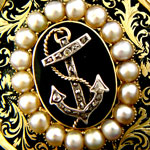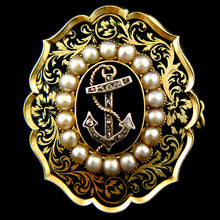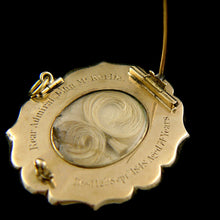Height: 3.7cm (1.5in)
Obverse: gold and of half-arch and ogee border design containing gold foliate scrollwork set against a ground of black enamel centered on an oval panel of enamel surmounted by a diamond set fouled anchor within a border of eighteen pearls. Reverse: a glazed locket compartment containing a lock of hair, the gold border engraved ‘Rear Admiral John McKerlie’ / Died 12th Septr 1848. Aged 74 years’.
Read more
Rear Admiral John McKerlie (1774-1848) entered the Royal Navy as a volunteer in April 1794 having been at sea in the Atlantic and Baltic merchant service from a young age. Rated Able Seaman, he was sent from the receiving ship Royal William to join the elite frigate force based at Falmouth that cruised the Channel countering the activities of French commerce raiders. McKerlie was assigned to the frigate Arethusa (38) commanded by one of the most successful frigate captains of the day, Captain Sir Edward Pellew.
In early 1795 McKerlie followed Pellew into the 44-gun heavy frigate Indefatigable with the rate of Quarter-Gunner. Owing to a sound Scottish education and his knowledge of the sea McKerlie was soon acting as Indefatigable’s schoolmaster instructing the other eighteen ‘young gentleman’ of the gunroom in the specifics of their profession, having himself been appointed a midshipman. Throughout 1795 and 1796 he participated in the capture of the numerous French prizes which brought further fame and glory to Sir Edward Pellew. It was however early the next year that Indefatigable fought what is generally regarded as one of the boldest frigate actions of the French Revolutionary War.
On the dark and stormy night of 13 January 1797 the French 74 Droits de l’Homme was sighted off the Brittany coast. Pellew, recognizing that he was heavily outclassed, saw that the waves prevented his opponent from opening the lower gun ports and that the severe weather had caused the loss of the enemy’s topmasts. Seizing the initiative, Indefatigable closed followed by the frigate Amazon and raked the French ship of the line at every opportunity. The enemy replied with 4,000 canon balls over the next few hours until finally driven in to Audierne Bay irreparably damaged by British gunfire and the unabated gale. The sight of distant breakers however threatened the destruction of all three ships. Indefatigable, though with masts damaged and with four feet of water in her hold, alone just had time to alter course and escape.
For Pellew the action was a triumph, Lord Spencer at the Admiralty acknowledging that for two frigates to destroy a ship of the line was ‘an exploit which has not I believe ever before graced our naval Annals’. For McKerlie the action was a trauma, costing him his right arm and a severe wound to the thigh. McKerlie's sacrifice was deeply felt Sir Edward Pellew whom he followed to his subsequent command, the mutinous ship of the line Impetueux. While serving aboard the Impetueux, McKerlie participated in numerous boat actions during the Quiberon expedition in 1800, and was present during the planning of a proposed attack on Belleisle. Marshall’s Royal Naval Biography relates how McKerlie ‘…not having heard how he was to be employed, went up to Sir Edward, interrupted him in a conversation with Major-General Maitland, and asking what part he was to act in the event of a debarkation taking place? The answer was “McKerlie you have lost one hand already, and if you loose the other you will not have anything to wipe your backside with; you will remain on board with the first lieutenant and fight the ship as she is to engage an 8-gun battery.”’
The loss of an arm did little to impede McKerlie’s career. He was regarded as a talented surveyor and draftsman, working at onetime with the celebrated civil engineer Thomas Telford. He was also considered a first class shot. He received his lieutenant’s commission in 1804 and served in H.M.S. Spartiate at the Battle of Trafalgar on 21 October 1805. He was present in the capture of Flushing and the Walcheren expedition, and commanded a squadron of ships stationed off Heligoland; oversaw the defence and retreat from Cuxhaven; and was responsible for destroying enemy shipping on the Braak.
Unable to get a command after 1813, McKerlie returned to his native Galloway where he married, Harriet, daughter of James Stewart of Cairnsmuir, had one daughter, Lillias (1821-1915), to either or both of whom the present brooch no doubt belonged. In a post service career McKerlie served as a local magistrate and operated commercial vessels from the port of Garlieston. After almost twenty years ashore, he made an unlikely returned to the Royal Navy as captain of the experimental frigate Vernon between 1834 and 1837. He was awarded a Pension for Wounds on 8 May 1816.
Despite the ever growing kudos that was accorded to Trafalgar veterans in the early Victorian age, it is perhaps with greater pride that Admiral McKerlie recalled his service under Pellew (or Lord Exmouth, as he became); and in 1847 was one of only eight surviving veterans who had lived long enough to apply for the Naval General Service Medal with a clasp for the Droits de L’Homme engagement. The following year, in 1848, he died at Corvisel House, Newton Stewart, at the age of seventy-three.
References:
McKerlie, P.H., F.S.A. Scot., F.R.G.S.&C. (1878) ‘History of the lands and their owners in Galloway’, William Paterson, Edinburgh.
Marshall, Lieut. J., R.N. (1823-25) ‘Royal Naval Biography’, Pople, London
Noel-Smith, Hather, & Campbell, Lorna M. (2013) Merchant Adventurers: Alex McVicar and John McKerlie of H.M.S. Indefatigable, Paper presented at the Press Gangs, Conscripts and Professionals Conference, at the National Museum of the Royal Navy, Portsmouth, September 2013






